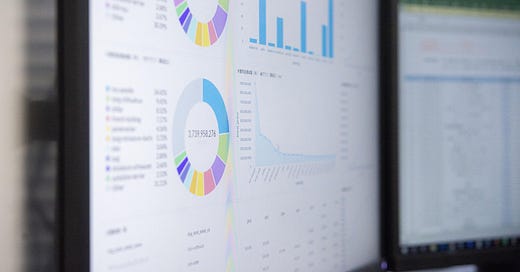MERL Managers: Use Your Data Skills in New Industries
Monitoring, Evaluation, Research and Learning professionals can pivot to data analysis - a high demand skill across the US economy
Professionals in are uniquely positioned to pivot to roles in adjacent sectors, private sector companies and consulting.
I am Amanda Makulec. I made that leap myself back in 2017, when I left JSI and joined Excella, a tech consulting firm based in Arlington.
I started at Excella as the Data Visualization Capability Lead and left as the Acting Director of AI and Analytics, when I decided to move into independent consulting.
Data Roles in Development
If you were in a role that falls within any of the following you likely have some of the necessary skills to seek data-related opportunities in a new sector:
Monitoring, evaluation, research, and learning
Health information systems
Data systems and web development
Data analytics
Strategic information
When I was working in the consulting company, we had major projects with private sector and government clients designing software, building data systems, and developing data visualization and analytics tools (among other things).
Sound familiar?
Data Roles in Domestic Industries
We typically think about data roles as falling into four big areas, outlined below, which I think is a helpful framework for considering the different types of data roles out there.
Data engineering
International development technologists who build and managed the back end of health or logistics information systems, or managed the data repositories for digital health applications.
They can focus on:
Organizing and curating data sources for automation.
Building and maintaining data warehouses, data lakes, and other repositories.
Languages like SQL and Python, and common data platforms like AWS, Azure, Databricks, and more.
Data analysis
Monitoring and evaluation researchers and team members who were responsible for collecting and reporting on program performance.
They can work on:
Answers questions with data, often looking to multiple sources for insight.
Conduct exploratory data analysis to identify patterns in large datasets.
Statistics to estimate margins of error and other nuances.
A wide range of tools depending on the company or industry including R, python, Tableau or PowerBI (more as dashboard users than developers), or Excel.
Data visualization
Dashboard developers working on health information systems or internal project monitoring dashboards and graphic designers who craft infographics or charts for project reports.
They can develop:
Charts, graphics, dashboards, and/or interactive data stories to communicate information to a wide range of stakeholders.
A foundational knowledge of best practices in visualization design.
Opportunities in a wide range of sectors from BI roles to data journalism.
Data science
Humanitarians with advanced analytics and statistics roles often within informatics or technology teams.
They can explore:
Massive volumes of information with advanced analytics and AI find patterns
Unstructured data to make sense of what looks like chaos.
How Python can build data models for multiple stakeholders.
Data Roles are Varied and Flexible
Often, people have deep expertise in one of these four data domains, but can speak the language of the others. There are also a lot of related skills and knowledge that can help position you for a new data role, including:
Understanding software development structures and tools - these could include Agile principles, experience using planning tools like Confluence or JIRA, or even learning some basic coding capabilities if you have ambitions of doing more in data engineering or interactive data visualization
User centered design, including how to test, fix, and iterate when designing an information system or data visualization product
Change management and communications - don’t underestimate the value and importance of supporting the use of whatever data tools you’re building
There Are Many Data Employers
Looking for data roles that are in similarly mission-focused areas, consider:
State and county government, including departments of public health
Local and national nonprofits - if you want to work on data team, a larger organization is more likely to have that opportunity while smaller orgs might rely on a solo ‘data person’ which can be challenging if you’re pivoting to a new role
Think tanks like Kaiser Family Foundation, Brookings Institute, and others - if it’s a place that publishes analysis and reports that you find useful, they often have a team responsible for that analysis work.
Consulting firms with a diverse range of clients, which could afford the opportunity to learn from the private sector on one assignment and also have some mission driven work with other clients down the road
One of the biggest challenges in navigating data opportunities is the wide range of different titles given to what could be the same role, and the same title meaning a wide range of different things depending on the company.





